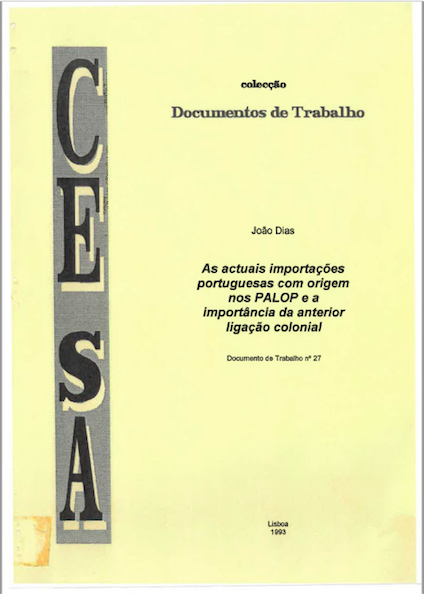Working Paper 27/1993: As actuais importações portuguesas com origem nos PALOP e a importância da anterior ligação colonial

Title: Working Paper 27/1993: As actuais importações portuguesas com origem nos PALOP e a importância da anterior ligação colonial
Author(s): Dias, João
Publication Date: 1993
Publisher: ISEG - CEsA
Quotation: Dias, João .1993. “As actuais importações portuguesas com origem nos PALOP e a importância da anterior ligação colonial”. Instituto Superior de Economia e Gestão. CEsA – Documentos de Trabalho nº 27/1993.
Abstract: Despite the low levels of PALOP exports to Portugal mentioned at the beginning of the text, the values involved must, of course, be analyzed taking into account the particular relationships involving these countries in the past and the projection of these relationships in the specific ties that still link them in the past. gift. A decade after the PALOP independence, the influence of these ties translates into a value of their exports to Portugal between thirty and fifty times what would be expected in the absence of such ties. Naturally, the existence of exchanges presupposes the availability of products to be exchanged, so these exports would have a different expression if the P ALOP offer was wider, including a wide range of manufactured products. This has to do with economic development (and the absence of internal armed conflicts).
Identifier: http://hdl.handle.net/10400.5/24201
Category: Working paper
Abstract:
In As actuais importações portuguesas com origem nos PALOP e a importância da anterior ligação colonial we discuss current Portuguese imports from the PALOP countries are rather small, representing together only about half a percentage point of the total. If we exclude oil imported from Angola, the importance of the PALOP countries falls even further, representing, in 1990, a mere 0.1 per cent of non-fuel Portuguese imports. These figures contrast sharply with those observed for the period prior to decolonization, when the PALOP accounted for percentages in the range of 10 to 15 per cent (appendix 1). Naturally, this drop is understandable in view of the break occurred in 1974-75 and is not, moreover, an exclusive phenomenon of the late Portuguese decolonization. In France, the United Kingdom, the Netherlands and Belgium, too, the former colonies now account for a minimal share of the respective imports. The reduction in the role of the ex-colonies as suppliers to the ex-metropolis also corresponds to a decline in the importance of the Portuguese market as a destination for PALOP exports, although here the contrast between the pre- and post-independence situation of these countries is less marked. In any case, only in the case of Guinea Bissau and Cape Verde does Portugal now absorb more than 10% (in this case, between 20 and 30%) of their total exports. Despite the low levels of PALOP exports to Portugal mentioned at the beginning of the text, the figures involved must, of course, be analysed taking into account the particular relationships involving these countries in the past and the projection of these relationships in the specific ties that still link them in the present. A decade after the independence of the PALOP countries, the influence of these ties translates into a value of their exports to Portugal between thirty and fifty times what would be expected in the absence of such ties. Naturally, the existence of trade presupposes the availability of products to be exchanged, and these exports would have a different expression if the PALOP’s offer were broader, including a wide range of manufactured products. This has to do with economic development (and the absence of internal armed conflicts).
Quotation:
Dias, João .1993. “As actuais importações portuguesas com origem nos PALOP e a importância da anterior ligação colonial”. Instituto Superior de Economia e Gestão. CEsA – Documentos de Trabalho nº 27/1993.





